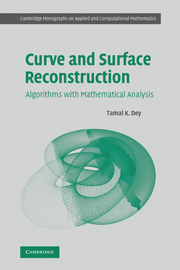4 - Surface Reconstruction
Published online by Cambridge University Press: 20 August 2009
Summary
In the previous chapter we learned that the restricted Delaunay triangulation is a good approximation of a densely sampled surface Σ from both topological and geometric view point. Unfortunately, we cannot compute this triangulation because the restricted Voronoi diagram Vor P|Σ cannot be computed without knowing Σ. As a remedy we approximate the restricted Voronoi diagram and compute a set of triangles that is a superset of all restricted Delaunay triangles. This set is pruned to extract a manifold surface which is output as an approximation to the sampled surface Σ.
Algorithm
First, we observe that each restricted Voronoi cell Vp|Σ = Vp ∩ Σ is almost flat if the sample is sufficiently dense. This follows from the Normal Variation Lemma 3.3 as the points in Vp|Σ cannot be far apart if ε is small. In particular, Vp|Σ lies within a thin neighborhood of the tangent plane τp at p. So, we need two approximations: (i) an approximation to τp or equivalently to np and (ii) an approximation to Vp|Σ based on the approximation to np. The following definitions of poles and cocones are used for these two approximations.
Poles and Cocones
Definition 4.1 (Poles). The farthest Voronoi vertex, denoted p+, in Vpis called the positive pole of p.
- Type
- Chapter
- Information
- Curve and Surface ReconstructionAlgorithms with Mathematical Analysis, pp. 59 - 79Publisher: Cambridge University PressPrint publication year: 2006

